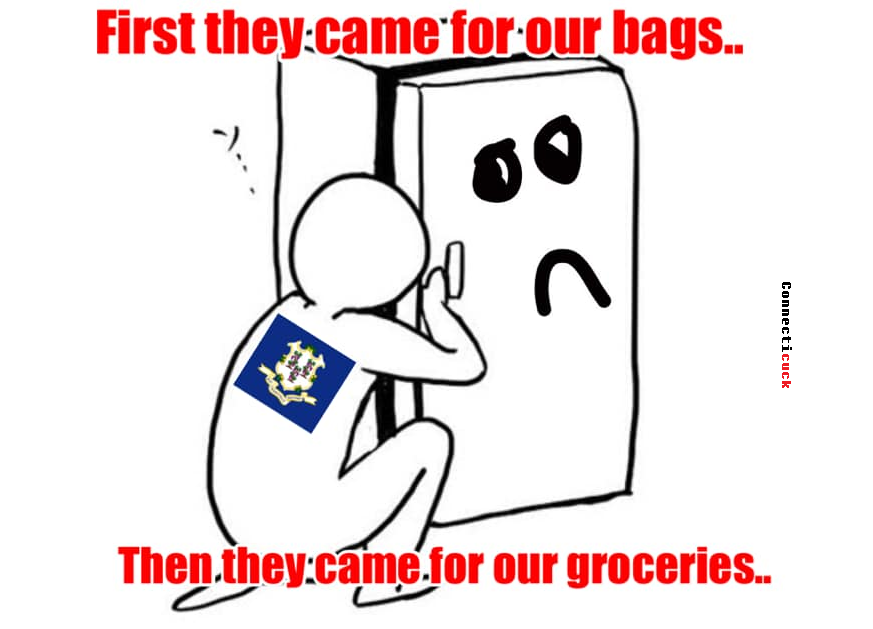A new “Meals Tax” contained in the Democrat biennial state budget will place a 7.35% tax on many grocery store items previously not taxed and add more financial burden on CT families & residents. Here’s everything you need to know.
The “meals tax” included in the Democrat and Governor Lamont’s state budget is set to go into effect October 1, 2019.
The tax applies to prepared and ready-to-consume foods sold at restaurants AND grocery stores.
The 7.35% tax will apply to not only prepared meals such as sandwiches, deli salads, pizza and hot buffet items, but also containers of lettuce, small packages of snacks, loose baked goods, wrapped salads, small servings of ice cream, and meal replacement bars. It also applies to fountain drinks including coffee and any beverage sold with a taxable “meal.”
“Governor Lamont and the Democrat regressive tax and spend biennial state budget continues to hurt working and middle class families, taking more and more out of people’s wallets every day for basic food and living needs.” — Senator Tony Hwang
Examples of Taxable “Meals” (taxed at 7.35% in eating establishments AND grocery stores):
-
Sandwiches, grinders, and wraps;
-
Popsicles, ice cream cones, cups, sundaes, and other individual servings of frozen desserts unless sold in factory pre-packaged multi-unit packs;
-
Ice cream, frozen yogurt, and other frozen desserts sold in containers of less than one pint;
-
Salads sold at salad bars;
-
Lettuce or greens-based salads sold in containers of 8 ounces or less;
-
Salads that are not greens-based (macaroni, potatoes, pasta, fruit, etc.) sold in containers of 8 ounces or less;
-
Donuts, muffins, rolls, bagels, and pastries (5 or fewer);
-
Cookies sold loose (5 or fewer when cookies are sold by quantity, or less than 8 ounces when cookies are sold by weight);
-
Pies or cakes by the slice;
-
Prepackaged or factory-sealed bags or packages of 5 ounces or less of chips, popcorn, kettle corn, nuts, trail mix, crackers, cookies, snack cakes, or other snack foods, unless sold in factory prepackaged multi-unit packs;
-
Pizza, whole or by the slice;
-
Cooked chicken sold by the piece, including buckets of chicken, and whole cooked chickens;
-
Cooked ribs sold by the piece or portion and whole racks of ribs;
-
Hot dogs served on a bun or heated;
-
Bagels that are individually prepared;
-
Soup sold in containers of 8 ounces or less, unless sold in factory pre-packaged units;
-
Smoothies;
-
Meal replacement bars;
-
All beverages provided with the sale of a taxable meal;
-
Food sold at a hot buffet;
-
Food that is cooked to order;
-
Popcorn, kettle corn, nuts and any other snack foods that are kept warm for purchase; and
-
Items such as salads, side dishes, and rolls, when sold as part of family pack meals typically including, whole chickens or buckets of chicken, when prepared and sold for immediate consumption, even when the items exceed the weight or quantity limits specified above
Examples of Taxable Drinks (taxed at 7.35% in eating establishments AND grocery stores):
-
Beer, including nonalcoholic beer;
-
Fruit juices, sweetened beverages, soft drinks, and soda;
-
Carbonated water;
-
Coffee or tea (ready to consume, hot or iced);
-
Distilled alcohol such as brandy, rum, whiskey, gin, vodka, and tequila;
-
Fountain drinks of any kind;
-
Hard cider;
-
Kombucha tea, and other naturally carbonated beverages;
-
Malt liquor;
-
Milkshakes;
-
Hot chocolate;
-
Syrup-flavored crushed ice drinks;
-
Wine
Earlier this year, Democrat lawmakers labeled the new tax as only a 1% tax increase on items already taxed at 6.35%, but the Department of Revenue Services (DRS) clarified this week that the new 7.35% tax will also apply to many food items that have never been taxed at all before when sold in grocery stores. The policy also results in a tax increase on food items sold by restaurants and eating establishments.
To see the full policy statement from the Department of Revenue Services visit: https://portal.ct.gov/-/media/
.

